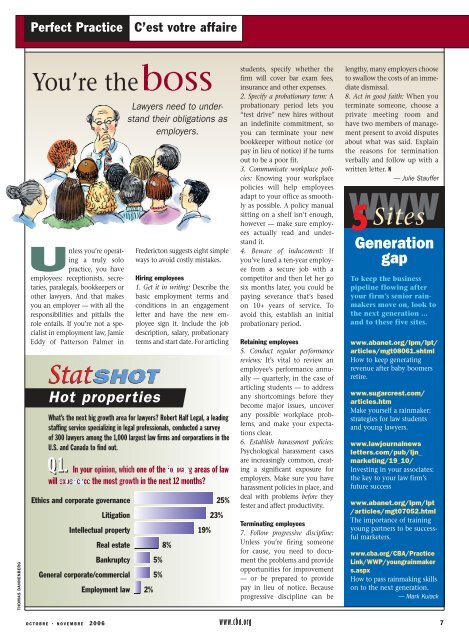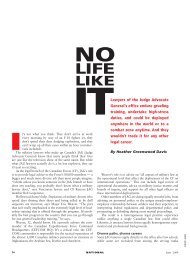ROBO-LAWYERS! ROBO-LAWYERS! - National
ROBO-LAWYERS! ROBO-LAWYERS! - National
ROBO-LAWYERS! ROBO-LAWYERS! - National
Create successful ePaper yourself
Turn your PDF publications into a flip-book with our unique Google optimized e-Paper software.
THOMAS DANNENBERG<br />
Perfect Practice<br />
StatSHOT<br />
Hot properties<br />
C’est votre affaire<br />
You’re theboss<br />
Unless you’re operating<br />
a truly solo<br />
practice, you have<br />
employees: receptionists, secretaries,<br />
paralegals, bookkeepers or<br />
other lawyers. And that makes<br />
you an employer — with all the<br />
responsibilities and pitfalls the<br />
role entails. If you’re not a specialist<br />
in employment law, Jamie<br />
Eddy of Patterson Palmer in<br />
Lawyers need to understand<br />
their obligations as<br />
employers.<br />
Fredericton suggests eight simple<br />
ways to avoid costly mistakes.<br />
Hiring employees<br />
1. Get it in writing: Describe the<br />
basic employment terms and<br />
conditions in an engagement<br />
letter and have the new employee<br />
sign it. Include the job<br />
description, salary, probationary<br />
terms and start date. For articling<br />
What’s the next big growth area for lawyers? Robert Half Legal, a leading<br />
staffing service specializing in legal professionals, conducted a survey<br />
of 300 lawyers among the 1,000 largest law firms and corporations in the<br />
U.S. and Canada to find out.<br />
Q1.<br />
In your opinion, which one of the following areas of law<br />
will experience the most growth in the next 12 months?<br />
Ethics and corporate governance 25%<br />
Litigation 23%<br />
Intellectual property 19%<br />
Real estate 8%<br />
Bankruptcy 5%<br />
General corporate/commercial 5%<br />
Employment law 2%<br />
OCTOBRE · NOVEMBRE 2006 www.cba.org<br />
students, specify whether the<br />
firm will cover bar exam fees,<br />
insurance and other expenses.<br />
2. Specify a probationary term: A<br />
probationary period lets you<br />
“test drive” new hires without<br />
an indefinite commitment, so<br />
you can terminate your new<br />
bookkeeper without notice (or<br />
pay in lieu of notice) if he turns<br />
out to be a poor fit.<br />
3. Communicate workplace policies:<br />
Knowing your workplace<br />
policies will help employees<br />
adapt to your office as smoothly<br />
as possible. A policy manual<br />
sitting on a shelf isn’t enough,<br />
however — make sure employees<br />
actually read and understand<br />
it.<br />
4. Beware of inducement: If<br />
you’ve lured a ten-year employee<br />
from a secure job with a<br />
competitor and then let her go<br />
six months later, you could be<br />
paying severance that’s based<br />
on 10+ years of service. To<br />
avoid this, establish an initial<br />
probationary period.<br />
Retaining employees<br />
5. Conduct regular performance<br />
reviews: It’s vital to review an<br />
employee’s performance annually<br />
— quarterly, in the case of<br />
articling students — to address<br />
any shortcomings before they<br />
become major issues, uncover<br />
any possible workplace problems,<br />
and make your expectations<br />
clear.<br />
6. Establish harassment policies:<br />
Psychological harassment cases<br />
are increasingly common, creating<br />
a significant exposure for<br />
employers. Make sure you have<br />
harassment policies in place, and<br />
deal with problems before they<br />
fester and affect productivity.<br />
Terminating employees<br />
7. Follow progressive discipline:<br />
Unless you’re firing someone<br />
for cause, you need to document<br />
the problems and provide<br />
opportunities for improvement<br />
— or be prepared to provide<br />
pay in lieu of notice. Because<br />
progressive discipline can be<br />
lengthy, many employers choose<br />
to swallow the costs of an immediate<br />
dismissal.<br />
8. Act in good faith: When you<br />
terminate someone, choose a<br />
private meeting room and<br />
have two members of management<br />
present to avoid disputes<br />
about what was said. Explain<br />
the reasons for termination<br />
verbally and follow up with a<br />
written letter. N<br />
— Julie Stauffer<br />
WWW<br />
5 Sites<br />
Generation<br />
gap<br />
To keep the business<br />
pipeline flowing after<br />
your firm’s senior rainmakers<br />
move on, look to<br />
the next generation …<br />
and to these five sites.<br />
www.abanet.org/lpm/lpt/<br />
articles/mgt08061.shtml<br />
How to keep generating<br />
revenue after baby boomers<br />
retire.<br />
www.sugarcrest.com/<br />
articles.htm<br />
Make yourself a rainmaker:<br />
strategies for law students<br />
and young lawyers.<br />
www.lawjournalnews<br />
letters.com/pub/ljn_<br />
marketing/19_10/<br />
Investing in your associates:<br />
the key to your law firm’s<br />
future success<br />
www.abanet.org/lpm/lpt<br />
/articles/mgt07052.html<br />
The importance of training<br />
young partners to be successful<br />
marketers.<br />
www.cba.org/CBA/Practice<br />
Link/WWP/youngrainmaker<br />
s.aspx<br />
How to pass rainmaking skills<br />
on to the next generation.<br />
— Mark Kuiack<br />
7








